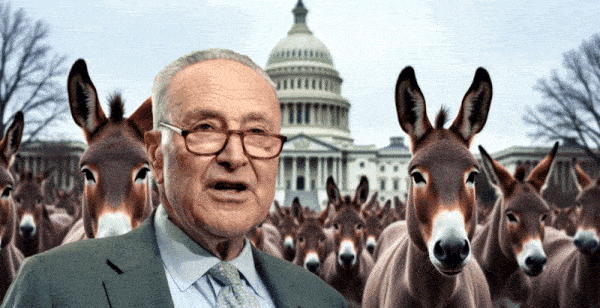
Schumer Threatens Government Shutdown, Something He, Other Senate Dems Decried as ‘Chaos’ in March
Senate Majority Leader Chuck Schumer, D-N.Y., said this week that he’s ready to force a federal government shutdown at the end of the month if Democrats don’t get the spending that they want.
That would be a reversal in rhetoric after some Democrat senators, including Schumer, warned in March about the dire consequences of a government shutdown.
At that time, Schumer explained his decision to vote for a Republican continuing resolution to fund the government by saying, “It’s not really a decision. It’s a Hobson’s choice.”
“Either proceed with the bill before us or risk Donald Trump throwing America into the chaos of a shutdown. This, in my view, is no choice at all. While the [House bill] is very bad, the potential for a shutdown has consequences for America that are much, much worse,” the Democrat minority leader contended at the time.
Schumer was joined by several other Democrat senators, who voted with Republicans to prevent a government shutdown. They echoed his sentiment about how closing nonessential elements of the federal government would harm Americans.
“I’m outraged by the reckless actions of President Trump, Elon Musk, and Republicans in control of Congress, so I refuse to hand them a shutdown where they would have free rein to cause more chaos and harm,” Sen. Catherine Cortez Masto, D-Nev., explained at the time.
“There is very little about this [continuing resolution] that I like—but there is even less I like about shutting down the government. With Donald Trump and Elon Musk taking a chain saw to the federal government’s workforce and illegally freezing federal funding, the last thing we need to do is plunge our country into further chaos and turmoil by shutting down the government,” Senate Minority Whip Dick Durbin, D-Ill., argued in his statement about voting to keep the government funded.
Sen. Brian Schatz, D-Hawaii, said that a government shutdown would hurt his state in particular.
“My job is to protect people in Hawaii. Today’s vote on the continuing resolution was a difficult and close call, but ultimately, I made the determination that a flawed bill was better than no bill at all. A shutdown would enable Donald Trump and Elon Musk to unilaterally determine that the vast majority of federal workers are not essential. And given the number of federal workers in Hawaii, mass furloughs would be deeply painful for people across the state,” the Hawaii senator contended in a comment about his support of the March continuing resolution.
Sen. Gary Peters, D-Mich., worried about a government shutdown’s effect on the economy.
“Shutdowns are also incredibly damaging. The last shutdown cost the U.S. economy $11 billion. Make no mistake, a shutdown under President Trump right now would be catastrophic,” Peters said in a statement.
In December 2024, Sen. Maggie Hassan, D-N.H., held that government shutdowns “have real and severe impacts on the American people, including by risking our national security and threatening livelihoods—which is why it is important that we voted on a bipartisan basis to avert a shutdown.”
She added in March regarding her decision to vote for a continuing resolution that the choice “was between a federal government shutdown that would hurt Granite Staters and Americans, especially our most vulnerable neighbors, or a partisan government funding bill. I have concluded that allowing the federal government to shut down with this president in charge is too dangerous to risk.”
“Our economy is already in a tailspin due to President Trump’s reckless trade war and general instability, and a shutdown harms innocent families, children, and seniors,” Sen. Kirsten Gillibrand, D-N.Y., asserted in a statement about her vote in support of the continuing resolution in March.
Time will tell if Democrat senators support Schumer in potentially holding the government hostage over spending or once again join Republicans to keep federal personnel on the job. The deadline to avert a shutdown is the end of the fiscal year on Sept. 30.



